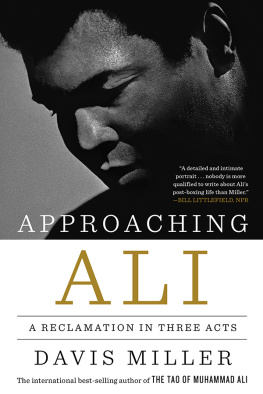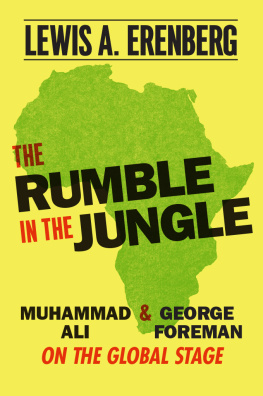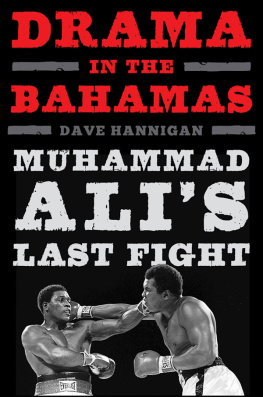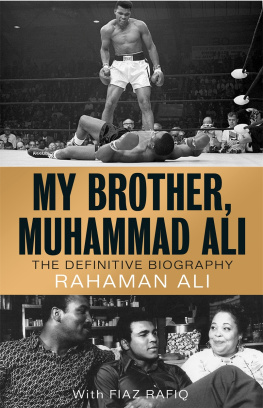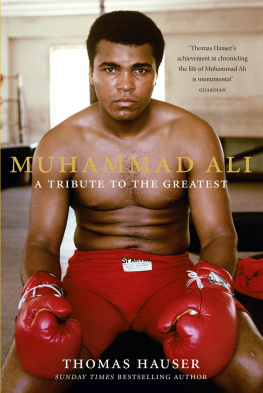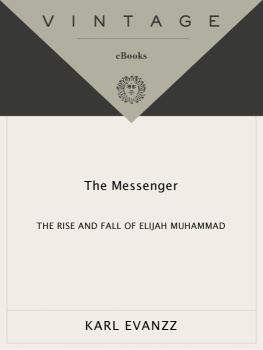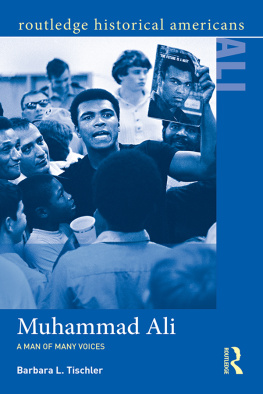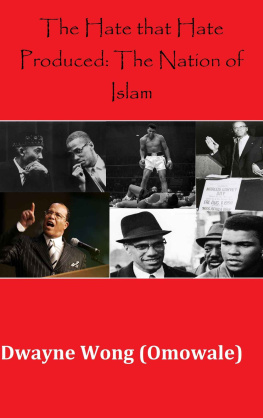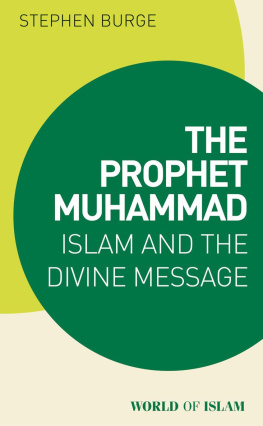T his book is dedicated to: the great photographer, Jose Fuentes; Barbara Lowenstein, my agent; Shaye Arehart, and to Sam Greenlee Billy Bang, Jack Newfield, Reginald Major, Ed Hughes, Fred Ho, Clayton Riley, Emanuel Steward, Amiri Baraka, Oscar Hijuelos, Sam Greenlee, and photographer Charles Robinson whom I interviewed, but who didnt live to see the publication of this book.
Introduction
The Curious History of an Icon
I call this book The Complete Muhammad Ali because most of the one hundred books about the champion, the majority of which are worshipful, are either too adoring or make excessively negative assertions, like Jack Cashills blaming Ali and Gerald Ford for the loss of Vietnam. For Mark Kram, Ali is a malicious buffoon. For Thomas Hauser, hes a saint, though Hausers opinion has changed. White sports writers have been generally hostile to black athletes, yet they monopolize the coverage of athletes and always seem to be searching for a white hope who would best the reigning black champion.
In contrast to some of their copy, Jack London, who allegedly created the term white hope, was very respectful of heavyweight champion Jack Johnson. Authors of the two bestsellers, one of which was overseen by Yolanda Ali, and the other written by an Ali fan, disregard any information that would interfere with their reference for The King of the World. Others are those whom I call The Ali Scribes, liberal writers located in the Northeast, who base their admiration of Ali upon his refusal to fight in an unpopular war without noting that he was following the example of his mentor, Elijah Muhammad, who refused to fight in a popular war. World War II was seen as a war of The Greatest Generation, against the forces of fascism, while this coveted generation practiced their fascism against black soldiers, who had to fight both the enemy and white officers and GIs. Just as George Washington treated English mercenaries better than his slaves, enemy prisoners were treated better in the south than black soldiers.
When speaking of the white volunteers who came south to assist in registering of black voters, while in the media version blacks stood by passively like the characters in the film Django Unchained, Askia Tour could have been speaking of The Ali Scribes. Ali made the sacrifice, while they held meetings in a downtown pub deliberating about his choices.
Askia Tour was one of those responsible for purging northern liberals from SNCC (The Student Non-Violent Coordinating Committee). He said it was done because while blacks were taking the risks, the liberals were calling their friends located in cities all over the North and giving the blacks directions from their tables in coffee shops, or in the immortal words of David Hilliard, a member of the Black Panther Party and one of the guardians of its legacy: They needed a nigger to pull the trigger. This could be true of The Ali Scribes; they celebrated Alis defiance of the draft, a sacrifice that they would not make themselves.
The Ali Scribes genuflection before the champion was a factor in Ali believing in his invincibilitya belief that led to serious injuries in the ring, injuries incurred as a result of his staying in the game long after the powers that were responsible for his ascendancy had been shot. Sports commentator Bill Clayton even provided some punch stats to compute the number of punches Ali received with the decline of his ring abilities. According to Claytons calibrations, in the first Liston fight, Ali was hit with less than a dozen punches per round. In Ali-Liston II, Liston landed only two. Cleveland Williams hit him with only three punches during their bout. However, Joe Frazier hit him with four hundred forty punches at the Thrilla in Manila, Leon Spinks hit him with four hundred eighty-two punches in their first fight, and Larry Holmes connected with three hundred and twenty punches (Hauser, 2005).
Alis legend hangs upon the act of defying the Selective Service, which still brings him either praise or condemnation from his supporters and enemies. His response to the press when asked whether he would serve in Vietnam (No Vietnamese ever called me a Nigger) was framed by a Nation of Islam (NOI) member Sam X, or Abdul Rahman. Though the Scribes give others credit for introducing Ali to the Nation of Islam, Ali has agreed with Sam X that it was him.
My interview with playwright Marvin X shows that Elijah Muhammad controlled Alis life to such an extent that he told him when to speak and when not to speak, and Alis ex-wife, the late Sonji Clay, said that Ali divorced her because Elijah Muhammad ordered him to do so. And so, is Ali being praised for following orders? And what are we to make of his confession, made in confidence to the late Jack Newfield, that he didnt become a devout, true believer in Allah until the mid-1980s, when my career was over, and miniskirts went out of style (Newfield, The Nation). Does this mean that his seeking conscientious objector status on the grounds of being a Muslim minister, the move that brought him fame, was disingenuous?
Alis is also a story of an innocent and wide-eyed youngster who became corrupted by unsavory and sinister members of his entourage, associates who sought to gain financially from his generosity. Mark Kram reports that when Ali traveled to Manila, he was picking up the bills for over thirty members of his entourage. Among these hangers-on were those who encouraged him to fight far beyond his best years so much so that the once magnificent athletea man who for some resembled one of the mythic gods of ancient lorehad been, by the time of his return to Louisville, Kentucky, for the opening of the Ali Center, reduced to a stumbling, easily fatigued, and mumbling person. He had become someone who was hooked to a device that could turn him on and off like a radio. For allowing this man to fight while showing signs of Parkinsons disease and kidney damage, these hangers-on should be charged with conspiracy to commit murder. Though many saw Alis lighting of the Olympic torch as heroic, the image of a physically challenged Joe Louis being wheeled around as a greeter at a Las Vegas casino came to the minds of some of the African Americans and hip whites whom I interviewed. Cus DAmato, Floyd Pattersons manager, and before him playwright Ntozake Shanges father, a fight doctor, warned, early in his career, of Ali taking too many blows during sparring sessions and predicting such punishment would injure his health.
Only in boxing would a man be praised for recovering from devastating knockdowns such as those Ali received from Sonny Banks in 1962, Henry Cooper in 1963, Joe Frazier in 1971, and Chuck Wepner in 1975. When he was sixteen, he was knocked out by a fighter named Willy Moran. Ali had the habit of inviting the hardest blows from his sparring partners, thinking that such a regimen would enhance his tolerance for pain. His final condition was predictable. Ali stood trembling with Parkinsons, once again showing the world the courage and dignity of a champion for all times, wrote John Stravinsky, author of Muhammad Ali(Stravinsky, 1997).
While some blacks and many whites were moved by what was considered a heroic feat, namely his lighting the Olympic torch, some whites were glad to see him in this condition of physical deterioration. His wife Lonnie says he doesnt want to be pitied, yet he is pitiable for someone like me who saw him when he was at the beginning of his career in Greenwich Village and Harlem, while walking with my friend, Malcolm X, in the 1960s, and later in New Orleans.
The blacks whom I interviewed viewed the scene taking place at the Olympics as one in which someone who was regarded as a sassy Bad Nigger was being humbled to the delight of the millions who had hated him when he was a defiant loudmouth, who questioned their values often in cruel and sarcastic tones. Ray Robinson, Jr., son of the great fighter, told me that they love him now because The Lion has been tamed. The late novelist Sam Greenlee, who paid a higher price than Ali for his defiance, said to me that they love him because he is old and senile. Journalist and novelist Jill Nelson agreed with other blacks whom I interviewed, blacks whose points of views are usually omitted from the tributes to Ali in books by The Ali Scribes, who interview each other, or express admiration for each others work (and even clothing apparel!).


